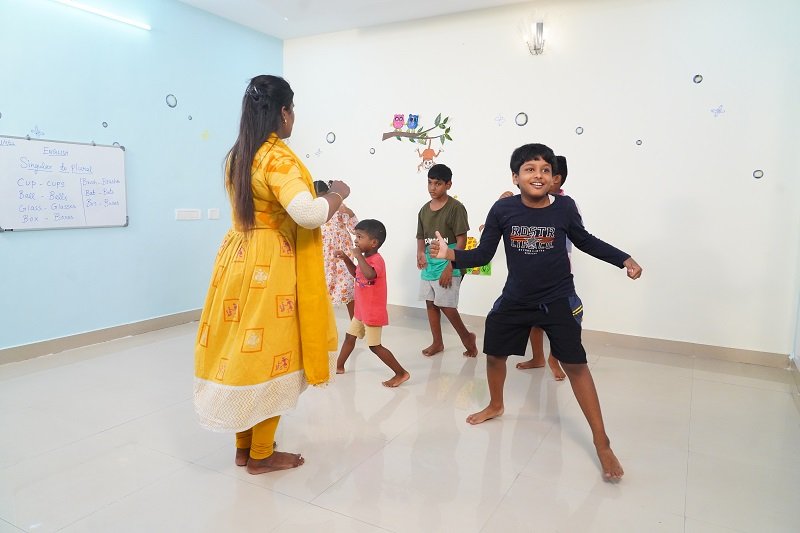Dance / Movement Therapy
Dance/movement therapy (DMT) is a therapeutic approach that uses movement and dance to support the physical, emotional, and social well-being of individuals. For special children, DMT can be particularly beneficial in addressing various developmental and emotional needs.

Here are key aspects of dance/movement therapy for special children:
- Body Awareness: DMT helps special children become more aware of their bodies, improving coordination and spatial awareness. This can be especially beneficial for children with motor coordination challenges.
- Emotional Expression: Movement allows special children to express themselves creatively, offering a non-verbal outlet for emotions. DMT provides a safe space for emotional exploration and expression.
- Social Interaction: Group dance/movement therapy sessions encourage social interaction, cooperation, and communication. Children can engage in shared movement experiences, fostering a sense of connection with peers.
- Sensory Integration: DMT incorporates various sensory stimuli, contributing to sensory integration. Movement activities can help special children regulate sensory experiences and enhance their ability to process sensory information.

- Motor Skills Development: Engaging in dance and movement activities promotes the development of both fine and gross motor skills. Special children can improve their coordination, balance, and overall physical abilities.
- Self-Expression and Creativity: DMT provides a creative outlet for self-expression. Through movement, special children can explore their creativity and individuality, promoting a sense of empowerment.
- Communication Skills: Movement can be a powerful form of communication. DMT helps special children improve their non-verbal communication skills, fostering expression and understanding without relying solely on words.
- Emotional Regulation: Dance and movement activities support emotional regulation by providing a structured and rhythmic outlet for releasing energy and stress. This can contribute to a sense of calmness and well-being.
- Body Positivity: DMT promotes a positive relationship with one’s body. Special children can develop a more positive self-image and improved self-esteem through movement experiences that focus on the joy of moving.

- Cognitive Enhancement: Movement-based activities in DMT can stimulate cognitive functions, including memory, attention, and problem-solving. This cognitive engagement contributes to overall cognitive development.
- Individualized Approach: DMT sessions are tailored to the unique needs and abilities of each child. Therapists design activities that accommodate individual differences, ensuring that the therapy is inclusive and effective.
- Therapeutic Relationship: Dance/movement therapists build supportive relationships with special children, creating a trusting and safe environment for emotional and physical exploration.
Dance/movement therapy offers a dynamic and inclusive approach to supporting the development and well-being of special children. Through creative and purposeful movement experiences, children can achieve physical, emotional, and social goals in a therapeutic setting.
At Apple Valley center, we use psychotherapeutic movement to promote emotional, social, cognitive, and physical integration of the individual, for the purpose of improving health and well-being.


